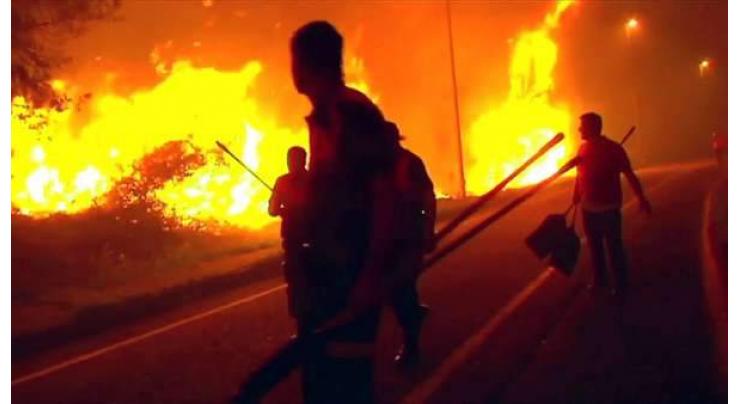
Rain, Winds Help Tame Wildfires In Spain And Portugal
Sumaira FH Published October 17, 2017 | 04:15 PM

Overnight rain and winds helped firefighters tame wildfires that devoured homes and people in their cars, leaving 36 dead in Portugal with four also killed in blazes in northern Spain
LISBON, Portugal, (APP - UrduPoint / Pakistan Point News - 17th Oct, 2017 ) :Overnight rain and winds helped firefighters tame wildfires that devoured homes and people in their cars, leaving 36 dead in Portugal with four also killed in blazes in northern Spain.
Portugal's civil protection agency said Tuesday that the 15 biggest fires had been brought under control, adding that seven people were still missing as the country began three days of national mourning for the victims.
The deaths, which included a one-month-old baby, came four months after 64 people were killed in the deadliest fire in the country's history in June. "We went through absolute hell, it was horrible.
There was fire everywhere," a resident of the town of Penacova, near Lousa, told RTP television. In a village in the commune of Vouzela, in the northern district of Viseu, people used water hoses to try to fight the flames as several homes were consumed.
"Everything happened in 45 minutes, the fire came at the foot of the village and spread at an incredible rate," resident Jose Morais told AFP. "I had never seen anything like that before. It felt like the end of the world.
Everyone fled". The blazes which broke out over the weekend were blamed on arsonists and fanned by Hurricane Ophelia. Lisbon declared a state of emergency in areas north of the Tagus river which effectively slices the country in half.
The civil protection agency said that about 50 teams and more than 5,000 firefighters remained deployed and that a red alert in place since Sunday would remain in place until 2000 GMT Tuesday. "We will this morning review the measures on the ground," Paulo Santos from the civil protection agency said on TSF radio.
But rail services resumed Tuesday in the country's north after being suspended on Sunday. Fallen electricity pylons and abandoned cars were left lying in roads. "Most of the victims were killed in their cars, but we also found them inside their houses," the mayor of the town of Oliveira do Hospital, Jose Carlos Alexandrino, said on public television RTP.
"The whole city looked like a ball of fire, surrounded by flames on all sides," he said. Portuguese Prime Minister Antonio Costa reaffirmed his pledges to prevent new tragedies by carrying out "fundamental reforms" in forest management and firefighting.
"After this year, nothing should remain as it was before," he said. A report by experts unveiled last week following the deadly June fires pinpointed several problems that hampered efforts to contain the blaze, including the fact that firefighters, the majority of them volunteers, were not sufficiently trained.
They said the army should play a greater role in disaster management and underscored that emergency services workers faced communication problems after emergency network phone masts burned down.
Portugal also faces strong winds off the Atlantic and scientists say climate change has also extended the "wildfire season". The country is also dotted with fast-burning eucalyptus trees used to supply the paper industry.
Even before the latest blazes, nearly 216,000 hectares (530,000 acres) had been consumed by wildfires across the country between January and September, according to estimates from the country's forest service.
- 'Intentional fires' - Fires also abated Tuesday in Galicia, on Spain's border with Portugal, with the toll rising to four deaths from the three reported previously, regional authorities said.
The latest fatality involved a 70-year-old man who perished in the city of Vigo. However, 53 fires were still active in the region. "We have had a very, very difficult time with... several villages facing drought," Galicia's administrative head Alberto Nunez Feijoo told the RNE public radio.
Prime Minister Mariano Rajoy has blamed arsonists for most of the deadly wildfires, saying: "What we are experiencing here does not happen by chance."
Related Topics
Recent Stories

Aiman Khan granted UAE Golden Visa

PSX achieves significant milestone, surpasses 72,000 mark

Pak Vs NZ T20I: Orphaned children extended special invitation to watch match

Finance Minister lauds UNDP’s unwavering support during floods

President Raisi leaves for Iran from Karachi

Currency Rate In Pakistan - Dollar, Euro, Pound, Riyal Rates On 24 April 2024

Today Gold Rate in Pakistan 24 April 2024

Punjab CM inaugurates Pakistan’s first Virtual Women Police Station

Dutch model Donny Roelvink embraces Islam

Experts raise concerns over introduction of 10-stick packs

Iranian president arrives in Karachi

Law Minister expresses Govt's resolve to address issue of missing persons
More Stories From World
-
Escaped army horses bolt through central London
38 minutes ago -
China to send fresh crew to Tiangong space station
38 minutes ago -
Critics fear Togo reforms leave little room for change in election
48 minutes ago -
Victims of China floods race to salvage property
48 minutes ago -
Blinken back in China seeking pressure but also stability
58 minutes ago -
'So hot you can't breathe': Extreme heat hits the Philippines
1 hour ago
-
In Tajikistan, climate migrants flee threat of fatal landslides
1 hour ago -
Football: Italian Cup result
1 hour ago -
Biden pledges swift weapons delivery to Ukraine
1 hour ago -
China announces new partners for International Lunar Research Station
2 hours ago -
Astronauts of China's Shenzhou-18 mission meet press
2 hours ago -
Partial power outage at Fukushima plant, water release suspended
2 hours ago